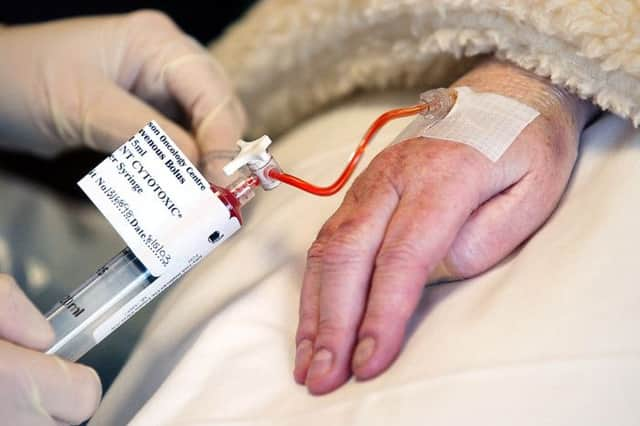Counting the cost of offering better care


Many will have seen the recent news that the first and only targeted chemotherapy drug for secondary breast cancer has been rejected again by the National Institute for Health and Care Excellence (NICE) for use on the NHS in England and Wales
Kadcyla is a unique, combination drug made up of an existing treatment called Herceptin and a very potent chemotherapy drug, DM1, linked together. It is a revolutionary treatment, linking the drugs in such a way that specifically targets cancerous cells while leaving healthy cells relatively untouched, meaning that the debilitating side-effects associated with chemotherapy treatment are reduced.
Advertisement
Hide AdAdvertisement
Hide AdIt targets a particular type of secondary breast cancer called HER2-positive and is aimed at women who have stopped responding to previous treatments. This drug has the potential to provide women with on average six months of additional time. While treatments for secondary breast cancer can only control the disease for a limited amount of time, six months represents a significant advance on the only alternative option, herceptin plus untargeted chemotherapy, which also has substantial side effects.
Women on the clinical trial for Kadcyla tell us they hugely value the sense of normality it brings due to the combined effect of additional months of life and the lack of side-effects. This allows women to return to work, to plan holidays and continue living. This normality, which the rest of us take for granted, can feel like a luxury for people with secondary breast cancer.
The decision not to approve this revolutionary new treatment is a real blow for women in England and Wales. Sadly this news has not come as a shock – Kadcyla is a brilliant drug, but it’s also incredibly expensive. NICE has done everything it can to approve it but despite this, and the discount offered by the manufacturer, Kadcyla is still too costly to be approved.
There is, however, still a chance it will be made available in Scotland on the NHS. And with over 1,000 women dying from secondary breast cancer every year this is incredibly important. The drug is currently being assessed by the Scottish Medicines Consortium and is one of the first to be considered under a new system intended to increase the number of approvals for “end-of-life” CV medicines. This places much greater emphasis on the voice of patients and clinicians and at Breakthrough Breast Cancer in Scotland we have worked really hard to make sure these will be heard. We already know clinicians in Scotland strongly support this drug. All four breast cancer charities that operate in Scotland support are calling for approval. Some 10,00 people have joined our online petition to call for more drugs like Kadcyla to be made available for people who need them in Scotland. And, most importantly, women with secondary breast cancer, along with their families, friends and carers, want this medicine approved.
One woman, who is already on a clinical trial for the drug said: “I should be dead and gone but instead, from the outside, my life is still as it was before my diagnosis. Everyone should have the right to live as well as they can for as long as they can, which is what Kadcyla allows.”
We believe all cancer patients should be able to access the best possible treatment, but for this to happen, prices set by the pharmaceutical industry for impressive, life-extending drugs such as Kadcyla must come down. We’ve seen a battle played out in the media in the last week between NICE and Roche – the manufacturer of Kadcyla - over who is to blame. This doesn’t help anyone, least of all those women with secondary breast cancer in need of such medicines.
For this drug to be affordable for the NHS in Scotland, we need the manufacturer to make every effort to reduce the price. We also need the decision makers to fully take account of the views of doctors, patients and charities across Scotland.
Let’s hope that the adversarial nature of the debate so far is replaced in Scotland, when the final decision is announced in October and there is a positive outcome which will give real hope to those women running out of options. It’s impossible to put a price on life’s precious moments. But it’s not impossible to put a fair price on medicines.
• James Jopling is Scotland director of Breakthrough Breast Cancer www.breakthrough.org.uk
SEE ALSO